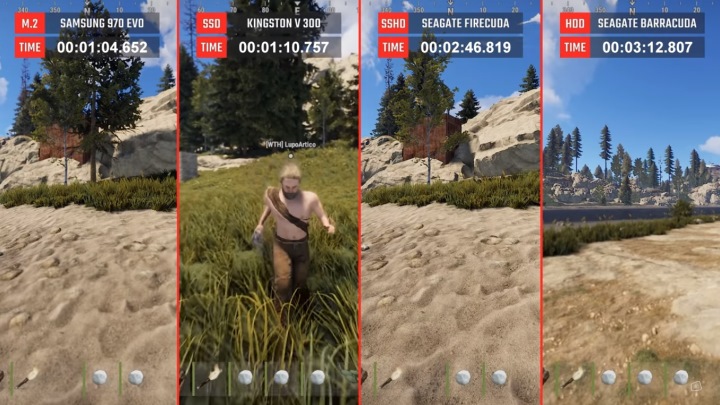HDD, SSHD, SSD, M.2 - speed benchmark of hard drives
Choosing the right hard drive shouldn't be limited only to its capacity. As the tests show, the different types of drives may differ much more (or much less) than we would expect.

The hYPERs team has uploaded two videos to their YouTube channel comparing the loading speed of several popular games on four different types of hard drives: standard disc (HDD), economical solid state drive (SSD), hybrid drive (SSHD), and expensive SSD NVMe with M.2 connector. The following models of drives were used for testing:
- Samsung M.2 SSD 970/960 EVO 250GB (M.2)
- Kingston V300 (SSD)
- Seagate FireCuda 1TB (SSHD)
- Seagate BarraCuda 500GB (HDD)
Results of the game loading speed test
M.2 | SSD | SSHD | HDD | |
00:00:13.444 | 00:00:14.445 | 00:00:18.865 | 00:00:28.873 | |
00:01:04.652 | 00:01:10.757 | 00:02:46.819 | 00:03:12.807 | |
00:00:27.288 | 00:00:28.389 | 00:00:51.041 | 00:00:52.576 | |
00:00:14.116 | 00:00:15.400 | 00:00:28.566 | 00:00:29.850 | |
00:00:10.733 | 00:00:13.216 | 00:00:36.650 | 00:00:41.483 | |
00:00:09.966 | 00:00:12.016 | 00:00:12.183 | 00:00:18.683 | |
00:00:06.200 | 00:00:08.933 | 00:00:23.183 | 00:00:27.216 | |
00:00:06.150 | 00:00:06.350 | 00:00:20.650 | 00:00:21.250 |
The difference between an expensive NVMe M.2 SSD and an economical SSD is very small (ranging from just over six seconds in Rust to just two tenths of a second in World of Warcraft). On the other hand, the difference between even the cheapest SSD and HDD/SSHDs is usually huge. The test shows that HDD games load on average 2-3 times longer than SSDs.
The conclusion is simple. There is no point in overpaying and buying expensive M.2 drives, since cheaper SSDs work only slightly worse from the fastest options and are enough to defeat the speed of HDDs and SSHDs.
0
Latest News
- This is expected to be the biggest year in the company's history. Blizzard prepares an offensive that will overshadow previous years
- Bethesda envied CD Projekt RED? Starfield may undergo a Cyberpunk 2077-style metamorphosis
- Season 2 has just started, and Todd Howard is already writing the script for the third one. Fallout 5 will be changed by the TV show
- 5 games to grab on Amazon Prime Gaming. Among them, a collection of RPG classics
- My experience attending the 2025 Game Awards, and why I loved it

